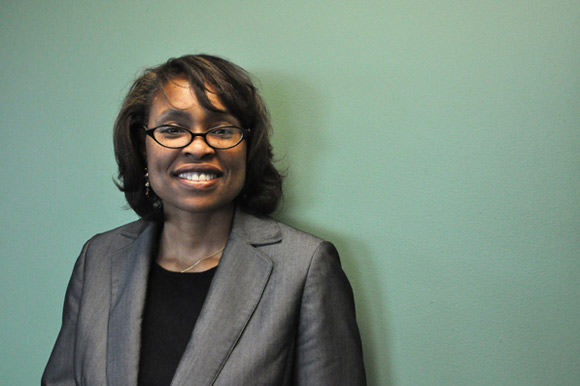Editor's note: This story first appeared in Pop City.
I had a frank discussion about race and Pittsburgh recently in a conversation that still haunts me.
A series of events brought me to lunch with an African American businessman, who has lived here for more than 15 years. He’s raised a family here. He’s invested in Pittsburgh. He’s extremely successful. And he’s leaving as soon as his oldest graduates from high school.
The things he told me confirm much of what I have already suspected since returning home two years ago after more than two decades away: Pittsburgh may be dubbed the Most Livable City for some, but it’s not easy for the black middle class.
The conversation led me to Melanie Harrington, chief executive officer of Vibrant Pittsburgh, an organization dedicated to growing diversity of the region and its workforce.
Harrington and her group have a plan for people who want to help. “If each of us could identify a person that is new to the area, a person that is not like you, and welcome that person to the area…that’s a huge start,” she said. “This person may not have a set of friends and family to connect with. Invite that person into your home. Take that person out with your friends. Introduce that person to your network.”
Harrington knows there are negative impressions of race relations here. But she also points to a big step forward: The creation of Vibrant Pittsburgh, which operates under the Allegheny Conference and shows there is a movement to attract diversity and help connect people.
“We need to be intentional about our efforts until one day it becomes automatic,” she said. “We’re on our journey. We’re not close to being done. We really have to work at this as a region.”
Bernadette Turner, executive director of Addison Behavioral Care, pointed out that it's challenging enough for an African-American, like her, who is from Pittsburgh, to live here let alone someone who moves here who has no connections. Helping transplanted African-Americans make connections is even more important for that reason.
I had another conversation recently with Evan Frazier, someone I’ve known for years. We graduated from Peabody High School in the city together.
Frazier went away to Cornell University and chose to return home, where he got a master’s at Carnegie Mellon University. He’s held a variety of prestigious jobs and now works as senior vice president of community affairs for Highmark. He’s also African American.
“I have a great deal of pride when it comes to Pittsburgh,” said Frazier. “Pittsburgh is my hometown. I have found that Pittsburgh, as a family town, is tremendous.”
Frazier also told me that race is a challenge here.
Statistics back him up: Pittsburgh has the highest poverty rate among working-age African Americans of the 40 largest regions in the U.S., according to a 2010 U.S. Census Bureau study.
“It’s a lot easier for me to live in Pittsburgh as a family guy than if I were single,” he said. “There isn’t the same sense as an African American of places to go where you can meet people. There’s not the same kind of black middle class neighborhood that you might have in other cities. It is here. But it is very limited.”
Frazier spoke of the need for more open platforms where people can engage about race. He said the city will lose its competitive edge nationally if it doesn’t continue to aggressively lure young minorities here for jobs, create an environment where they will want to stay, and strive to develop the African Americans that already live here in our city.
“Pittsburgh is a place where a lot of people aren’t talking about race,” he said. “There aren't a lot of platforms where people feel safe talking about race in a way that has a long, meaningful engagement. It will be a hot topic for a minute, but then it goes back to normal life in Pittsburgh.”
So, what do we do as residents?
“While I recognize it can’t just happen with me, I am fully willing and feel it is important to play my part in helping create a more diverse region and city,” Frazier said. “There are a lot of great benefits that people can receive by coming here that they may have never thought about. If you become a part of the fabric of the communities and what Pittsburgh is about, it can be a very rich experience for people.”
If there's one thing everyone seems to agree on it's the need for more open forums about race and inclusion for all ages, color, sex and abilities. Bricolage recently included a series of discussions about race after each performance of Dutchman, a play that examines the racial divide. The Design Center hosted Mindy Fullilove for a lecture recently with the most diverse audience we've ever seen and a rousing Q & A that focused very much on race. Bernadette Turner started a group called African American Leadership.
We're asking readers to get involved by joining the discussion right now at Engage! Pop City, our new civic engagement platform and find ways to expand and keep the conversation going. Who do you know who is doing something to move the region forward on this issue? How can others help? The floor is yours.
BEN SCHMITT graduated from Michigan State University in 1992 with a bachelor's degree in journalism. He worked as a reporter for several newspapers including the Detroit Free Press and won a national Emmy award in 2008 for two video stories about pit bulls. He also helped report on the downfall of former Detroit Mayor Kwame Kilpatrick, which earned the Free Press a Pulitzer Prize in 2009. He is now a marketing specialist for Chorus Call in Monroeville, assigned to help build a new web conferencing social media site, concert-oh.com. Send feedback here.
Pop City Editor Tracy Certo contributed to this story.


